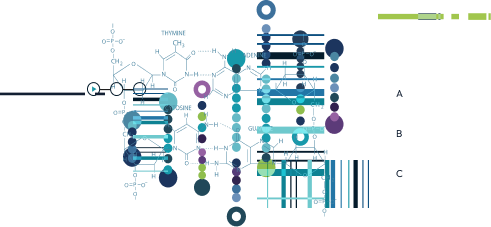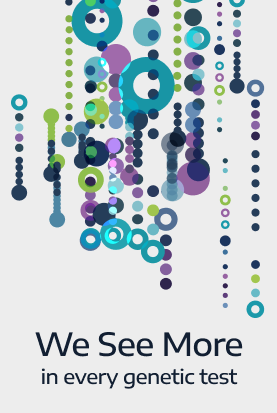CMT Genetic Testing with Genomic Unity®

What is Charcot-Marie-Tooth?
Charcot-Marie-Tooth (CMT) is a nerve disorder within the neuropathy family. It is characterized by loss of muscle strength in the hands, legs and feet that becomes progressively worse over time. Weakening muscles can lead to deformities in the hands and feet as well as atrophy which can result in mobility issues. Less commonly weakening muscles can impact swallowing, speech, breathing, hearing and vision.

What causes CMT?
CMT can be caused by DNA changes in more than 100 different genes.
These changes can be inherited from one or both parents, or can arise spontaneously.
The more you know, the better prepared you’ll be
Early symptoms of CMT are similar to symptoms of other nerve disorders. Genetic testing can help distinguish between different nerve disorders. Test results may confirm a CMT diagnosis or may identify a different diagnosis.
A genetic diagnosis enables the best possible medical management. Genetic testing may:
- Inform prognosis
- Identify CMT forms with specific targeted treatments or eligible clinical trials
- Identify treatments to stop or avoid
- Inform family planning

See more causes of CMT (and other nerve disorders) with Genomic Unity®
The type of genetic testing performed makes a difference in the quality of the results. When seeking a CMT diagnosis it’s important to choose the test that provides the most complete picture of your DNA.
Some cases of CMT are caused by changes in the number of copies of the PMP22 gene. Others are caused by a single base change in one of >100 different genes.
Only a test like Genomic Unity® that uses whole genome sequencing technology can detect DNA changes ranging in size from single base to full PMP22 gene duplications and deletions. Including changes in newly identified CMT genes, plus changes in genes associated with nerve disorders with symptoms similar to CMT.

With Genomic Unity®, only one test is needed
Genetic testing for CMT is often performed in multiple steps. Single gene testing for PMP22 duplication/deletion is typically ordered first. If this test is negative, a multigene panel to look for smaller sequence changes in the most commonly associated genes will be ordered as a follow up test. If this test is also negative, comprehensive exome or genome sequencing may be ordered to assess a larger set of associated genes. This sequential testing approach takes time and may even miss some diagnoses.
With Genomic Unity®, sequential testing is unnecessary. With a single test, Genomic Unity® can detect DNA changes ranging in size from single base to entire genes. While no genetic test can rule out the possibility that a rare, unexamined variant goes undetected, Genomic Unity® testing provides the most comprehensive view available today.

Ask your doctor about Genomic Unity® testing for CMT
Starting a conversation with your healthcare provider
Talking with your doctor or a genetic counselor is an important step in the process of making a decision about whether genetic testing is right for you. And if so, which genetic test is the best fit. The following questions may help get the conversation started:
- Based on my family history and personal history, what types of genetic testing are available to me? Single gene PMP22 testing? A CMT panel? Exome or genome?
- What types of genetic conditions will each test detect?
- What types of genetic conditions will each test NOT detect?
- What possible results can I expect from each test?
- How accurate is each test?

FAQs about Genomic Unity® testing for CMT
-
-
Genomic Unity® is recommended if your healthcare provider suggests diagnostic testing for CMT.
-
Genomic Unity® detects CMT in addition to related nerve disorders including hereditary neuropathy with liability to pressure palsies (HNPP), hereditary distal motor neuropathy with myopathic features (HMNMYO), giant axonal neuropathy and more.
-
Genomic Unity® Neuropathies Analysis provides targeted testing of 103 genes associated with neuropathies including CMT. The option is provided to automatically reflex up to Genomic Unity® Exome Analysis, Genomic Unity® Exome Plus Analysis or Genomic Unity® Whole Genome Analysis if initial testing is non-diagnostic.
-
A test report will be provided to your doctor within 4-8 weeks of receiving your sample. Reflex options may result in a longer wait time.
-
Genomic Unity® testing for CMT is covered by most insurances. For cases where insurance coverage is not available, we offer self pay pricing.
-
Genomic Unity® testing must be ordered by a healthcare provider.
If your healthcare provider needs assistance with obtaining test order forms, sample collection kits, etc, please contact us – we’re happy to help.
-
We See More, So you Know More
If your healthcare provider suggests CMT testing, ask about Genomic Unity®. The most comprehensive genetic testing available.
Have questions?
